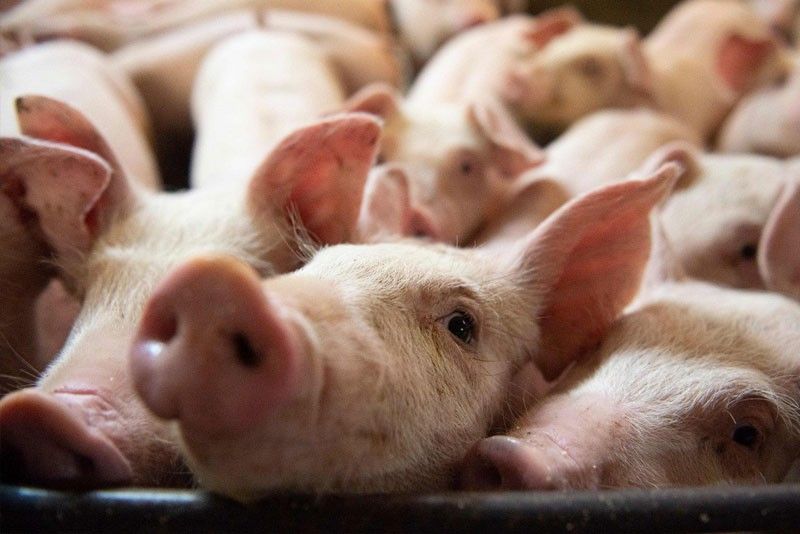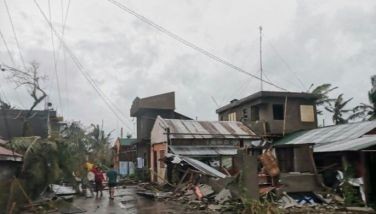ASF outbreak confirmed in areas of Bulacan, Rizal

MANILA, Philippines — The number of hog deaths from African swine fever in Rizal and Bulacan may be considered outbreaks, but Agriculture Secretary William Dar emphasized that there is no ASF epidemic nationwide.
“Specifically, ASF was already contained in Barangay Pritil, Guiguinto, Bulacan, and in several barangays in Rodriguez, San Mateo and Antipolo, Rizal – and not in the entire country,” Dar said in a statement.
In a radio interview with dzMM yesterday, Bureau of Animal Industry (BAI) officer-in-charge Ronnie Domingo said only Rizal and Bulacan can be considered as areas of outbreak based on its definition by the World Organization for Animal Health (OIE).
The OIE defines an outbreak as “the occurrence of one or more cases in an epidemiological unit.”
Domingo explained that prior to the recent ASF-caused hog deaths in Rizal, the province was free from the ASF virus. But with the confirmed deaths, Rizal can now be called an outbreak area.
“We can consider that as an outbreak, but I’m not saying it’s for the entire Philippines,” Domingo said.
Dar also appealed to the media and general public not to ignite fears regarding ASF, as unverified and unvalidated reports could create irreversible damage to the country’s P260-billion swine industry.
“Around two-thirds, or 65 percent, of the industry is contributed by small backyard raisers,” the agriculture chief said.
He added that 7,416 pigs in the one-kilometer radius in ASF areas in Rizal and Bulacan have already been depopulated, following the 1-7-10 protocol of the Department of Agriculture (DA) to manage, contain and control the spread of the disease.
“For instance, one ASF-infected slaughterhouse in Brgy. Gitnang Bayan 1, San Mateo, Rizal, has already been closed, cleaned and disinfected,” the DA said.
Dar said continuous strict surveillance is being conducted in areas near ASF-infected barangays in Rizal and Bulacan.
He assured the public that the incident will not affect the supply and prices of pork in the market, stressing that ASF is confined and specific in certain areas only and not in the entire country.
In Quezon City, Mayor Joy Belmonte said that live pigs in the city have tested positive for ASF.
She confirmed that tests came out positive even on live pigs subjected to random sampling by the BAI within the one-kilometer radius in Barangay Silangan.
There were a total of 14 dead pigs that also tested positive for ASF, more than the initial reported 11 pigs, Belmonte said.
The mayor said they have culled around 50 pigs in the one-kilometer radius where positive test results were found.
The city government is urging backyard pig raisers to sell their healthy pigs before infection sets in.
Belmonte said she is set to talk with her barangay officials for their official inventory on piggeries in their areas and to set a deadline for the phasing out of the piggeries.
In Zamboanga City, the Office of the City Veterinarian (OCVet) has set up stations alongside police and military checkpoints to monitor the shipment of live pigs and prevent the possible entry of ASF in the peninsula.
OCVet’s Arnedo Agbayani said they would bar any entry or shipment of live pigs or pork products that do not have the necessary veterinary health certificates and veterinary shipping permits, by any transporter. Local raisers are not exempted from the inspection.
However, in Malolos, Bulacan, a swine carcass was found floating in the Malolos river system in Barangay Bulihan on Sunday afternoon. The dead animal was chopped into several parts and thrown into the waterway.
The matter was reported to Bulihan village chieftain Crisanto de Jesus, who ordered it placed in sacks and turned over to the city veterinary personnel for proper disposal.
On Friday, at least 10 dead piglets were found floating in a waterway in Barangay Tikay. The cause of the piglets’ death and their owners are unknown.
Malolos Mayor Gilbert Gatchalian has ordered the city veterinarian to investigate the cause of the recent swine deaths in several barangays of Malolos in coordination with the personnel of the BAI.
Palace wants updates
Malacañang yesterday urged local officials to update the DA on ASF-related developments in their areas, as it reiterated that the government is working to prevent the spread of the virus.
Presidential spokesman Salvador Panelo echoed the agriculture secretary’s appeal to the media regarding the spread of unverified reports which may cause undue panic. “The better action would be to call the DA secretary first so that he would know exactly what is happening in one particular place,” Panelo said at a press briefing.
Panelo said there is no need for Malacañang to issue a directive on the ASF because Dar “knows what he is going to do.”
Local stakeholders are also calling on the government to stop the issuance of import permits for pork.
The Samahang Industriya ng Agrikultura (Sinag) is urging the DA to suspend issuance of sanitary and phytosanitary (SPS) permits for pork imports and cancel all SPS currently being processed.
“Protecting the local agriculture and supporting the interest of Filipino farmers at this time of an outbreak, through the non-issuance of SPS does not violate our commitment to the WTO (World Trade Organization),” Sinag chairman Rosendo So said.
Currently, the Philippines is instituting a ban on imports coming from China, Mongolia, Vietnam, Cambodia, Hong Kong, North Korea, Laos, Russia, Ukraine, Czech Republic, Moldova, South Africa, Zambia, Hungary, Bulgaria, Belgium, Latvia, Poland, Germany and Romania.
Further, Sinag is also asking the DA to increase the indemnity payment to backyard raisers to P5,000 from the current P3,000 per head.
Senate Majority Leader Juan Miguel Zubiri called on the DA, Bureau of Customs, the National Meat Inspection Service and other government agencies to move faster to contain the spread of ASF.
Zubiri presided over the hearing of the committee on the ASF last March, where he asked agencies not to let their guard down because of the “havoc and economic losses the ASF could bring into the whole country if ever this epidemic will reach our shores.”
Senate President Pro Tempore Ralph Recto earlier called for additional funding for disasters – including the outbreak of ASF – that the government should consider as a macro-economic assumption in hammering out the provisions of the proposed P4.1-trillion national budget for 2020.
The Department of Trade and Industry (DTI) is set to meet with meat producers this week as it assesses the impact of the ASF outbreak on prices of meat products.
Trade Secretary Ramon Lopez said the agency would be holding a meeting with meat producers this week to look at how the ASF outbreak in Bulacan and Rizal would affect the prices of meat products like chicken and beef.
“We’re expecting shift in demand for other meat products until the outbreak is contained,” he said. “This can suppress prices for pork products, but higher for other meat products.”
The DA – in partnership with LGUs at all levels, the private sector, Philippine National Police and the military – said it has enhanced its monitoring activities and imposed stricter biosecurity and quarantine measures to contain the spread of ASF in other areas. – With Louise Maureen Simeon, Paolo Romero, Roel Pareño, Romina Cabrera, Alexis Romero, Ramon Lazaro, Louella Desiderio
- Latest
- Trending




























